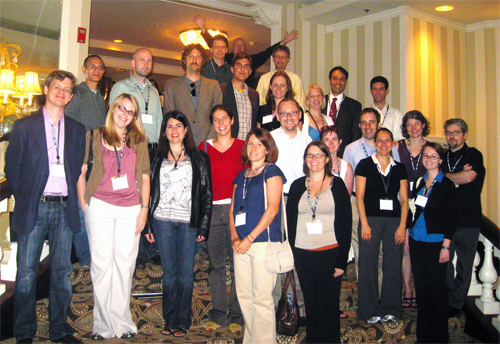Lewis R. Goldberg
 Lewis R. Goldberg is widely known for his foundational work in personality psychology. He has played a central role in the development of the Big Five model of traits (a name that he gave it), he was a pioneer of open science in creating free materials and datasets for the advancement of the field, and he is a much-beloved friend, collaborator, and mentor to many.
Lewis R. Goldberg is widely known for his foundational work in personality psychology. He has played a central role in the development of the Big Five model of traits (a name that he gave it), he was a pioneer of open science in creating free materials and datasets for the advancement of the field, and he is a much-beloved friend, collaborator, and mentor to many.
Lew’s very first class in college was a personality class taught by Gordon Allport. That class introduced him to the problem of how to create a taxonomy of personality traits. After receiving his A.B. in 1953, Lew went on to the University of Michigan where he worked with Warren Norman, receiving his Ph.D. in 1958. The two picked up the problem where Allport had left it, and the quest to understand personality structure would become a centerpiece of the rest of Lew’s career.

2nd Row: Gerard Saucier, Oliver John
3rd Row: Josh Eng, Chris Soto, Sam Gosling, Daniel Catterson, Sara Gorchoff, Jennifer Pals Lilgendahl, Sanjay Srivastava, Rick Robins
Front: Jason Rentfrow, Lindsay Graham, Nairan Ramirez-Esparza, Simine Vazire, Erika Carlson, Matthias Mehl, Shannon Holleran, Jennifer Lodi-Smith, Erik Noftle, Kali Trzesniewski, Angelina Sutin, Kimberly Livingstone, Brent Donnellan
After a two-year stint as a visiting assistant professor at Stanford, Lew arrived at the University of Oregon in 1960, where he would spend the rest of his career as faculty. In addition, he joined the newly founded Oregon Research Institute (ORI) in 1961. ORI has been a second home base for much of Lew’s career. Lew has been a leader in numerous professional societies, a sought-after consultant and panelist for businesses and funding agencies, and he has won just about every award imaginable, including three lifetime achievement awards: the Jack Block award from the Society for Personality and Social Psychology, the Saul Sells Award from the Society for Multivariate Experimental Psychology, and the Bruno Klopfer Award from the Society for Personality Assessment.
It is difficult to imagine what the field of personality psychology would look like today without Lew. He was a central figure, perhaps the central figure, in developing the Big Five structural model of personality traits. He has created a widely used resource with the IPIP. His research on clinical and actuarial judgment, dating back to his dissertation, has been enormously influential in personality assessment. The Eugene-Springfield Community Sample, a large longitudinal study that Lew ran out of ORI, has been a critical data source for countless researchers studying traits, interests, values, and more. Lew took over the Hawaii Longitudinal Study after his friend Jack Digman’s untimely death, and it has become an important resource for understanding how personality from childhood onward is related to health and other important outcomes. Perhaps no less important, Lew has always been an informal hub in the social network of the field, known for connecting people and for widely sharing preprints, data, and his own humorous observations in regular email blasts.
In his address for the Bruno Klopfer Award, Lew noted that his favorite IPIP item is “Am able to disregard rules.” As Lew described it, “Breaking rules can be good for you, if the rule-breaking hurts no one else and if one knows what one is doing and why one is doing it.” Lew’s career has exemplified this mindset, marked by deliberate and creative rule-breaking but always with genuine care for those around him. Psychology is much the better thanks to him.
- Lew Goldberg is rightly famous for his huge intellectual contributions in the field of personality psychology.
But what makes Lew such a valued colleague has been his generosity to us all.
He created the International Personality Item Pool, and has thereby given an invaluable tool to scientists and students all over the world.
He established the Eugene-Springfield Community Sample and has freely shared its dataset—probably the best ever collected—with anyone who asks to use it in their own investigations.
And as a collaborator, Lew is generous in every way—with data, with insights, with credit for the work. With that generosity—and his energy and enthusiasm in seeking the truth—he has been such a great colleague to so many of us.
-Michael Ashton - Throughout his career, Lew Goldberg has been the most generous person in psychology. Most obviously, he is generous with the products of his research, finding innovative ways to give away numerous useful and painstakingly-developed assessment instruments through IPIP, and even giving away his data – including, in the case of my own lab, the interview videos from the Hawaii Longitudinal Project. He was doing what is now called “open science” long before that was a thing. He is also consistently generous with his support for young researchers (including me, back when that was an accurate description), graciously and enthusiastically offering encouragement, praise and yes, also, criticism. I was never officially his student, but I’ve felt like one since about 1980, continuing to learn from his deep knowledge and, perhaps even more so, the force of his powerful example of what a person with a towering intellect, boundless energy and enthusiasm, and a generous spirit can do.
-David Funder - I have found that the beauty of Lew is the interesting contrast between his unbridled positivity, enthusiasm, optimism, and supportiveness on the one hand, and his impatience with and savage criticism of nonsense, bullshit, and things he sees as just plain wrong. I became acquainted with both sides of Lew when I sent him a proposal for sabbatical research I wanted to undertake in Germany for the 1990-91 academic year. He encouraged what he thought was good about it while mercilessly pointing out what was weak and could be done differently. He also shared with me stories of his own international ventures and encouraged me to pursue my sabbatical project at any cost, because such an experience would be priceless and life-transforming. He was right. As a result of my initial contact with Lew, my proposal was eventually funded, and he put me in contact with his wonderful colleagues at the University of Groningen, a short train ride from Bielefeld where I was working. There is no way I would have had the career I've had without that European experience made possible by Lew.
My relationship with Lew continued when I took an interest in his new International Personality Item Pool (IPIP). On my next sabbatical I spent a few days visiting and working with him at the Oregon Research Institute, explaining how I wanted to collect data on the Internet with one of his IPIP measures and apply some methods for detecting invalid protocols. Lew not only helped me develop my ideas about the online project, but also graciously treated me to the best food and drink, both in Eugene restaurants and in his home. But the most memorable part of my visit was a long walk we took along the Willamette River to talk about my life and my future. He asked if I would like to be a consultant for the IPIP website. I said yes, and it has been one of my most rewarding professional experiences. The next thing I know, I am back in Bielefeld and Groningen to share preliminary findings from my online inventory, publishing a paper on it, publishing another paper on online assessment with Lew, and then publishing another paper with him on the history and future of the IPIP. In my retirement, Lew has kept me busy, pushing me to publish another paper on an IPIP measure I developed, and then working with me on a revision of the IPIP website. Thank you, Lew, for everything!
-John A. Johnson - Anyone who has spent time reading Lew Goldberg's work knows he is a man with a brilliant mind. What those works don't reveal is that he is also a man with a brilliant heart. They don't tell you about the many kindnesses he has shown to me and to so many other psychologists over the years. They give you little sense of the many people who think of him with deep fondness. They tell you little of his willingness to go above and beyond for those he respects and cares about. Lew Goldberg, in a word, is a mensch.
-Robert McGrath - My first encounter with Lew was as a signed reviewer on one of the first papers I wrote as a grad student. He advocated with the editor for it to be published and said some very nice things about the theoretical and empirical merits of the paper, but he also insisted that it absolutely could not be granted a final acceptance unless we fixed a typo on page 20. We were happy to oblige.
When I arrived at Oregon, Lew immediately took a warm, academic-grandfatherly interest in me and my work. He took me out to lunch on a regular basis, asking how I was faring as a new assistant professor, how my research was coming along, asking after my family. He couldn’t have made me feel more welcome. Ask around and you will hear the same things again and again. For as well known as he is for his work (and rightly so), there are perhaps as many people who know him for his warmth and generosity of spirit.
-Sanjay Srivastava - Lew has inspired many personality researchers with his collaborative and curious spirit. His generosity with his data, time, and ideas have helped inspire others in the field. His work has been foundational in the field of personality - it is hard to imagine what personality psychology would look like without Lew Goldberg.
-Simine Vazire - I will always remember Lew's eloquent, forceful, and uncompromisingly empirical and transparent contributions toward mapping the varieties of human personality writ large. I also fondly remember reading his evocative account of travel experiences during a research sabbatical in the then still relatively peaceful Middle East.
-Auke Tellegen

